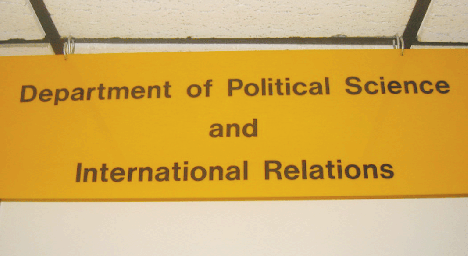Never before have politics become such an important part of American society. While the entire country is based on politics, many Americans do not fully understand the realm of political society. Regardless of whether politics are embraced or rejected, they affect everyone. Reading the newspaper, voting, and watching the news all involve acts of political discourse. Politics are everywhere especially in times of social unrest such as the present state of American society. But American politics are not the only politics that affect us, politics of all nations will in some way effect you and it’s not easy to decipher how they might.
To help sort through that confusion, the political science department here at UMass lends its expertise to help students come to their own conclusions about the world and what goes on it.
With an enrollment of 347 majors and minors, the political science department is training students to better understand the role of politics in all societies. This spring semester the department is offering 27 different courses ranging from Government Politics of the United States, to Boston: Cooperation and Conflict in the Urban Environment.There are presently 22 professors teaching in the department on both a full time and part time basis.
This semester welcomes a new professor, Leila Farsakh who is a specialist in Middle Eastern politics. Political science department chair, James Ward, feels that her experience in the field will be an asset to the department.”We’re expecting that she will be able to offer courses in various aspects of the Middle East,” says Ward The department also offers two study abroad programs in Mexico and Ireland. The programs are held over winter and summer breaks respectively.
Although the courses are costly, they offer perspectives on other political systems that are a valuable comparative tool for learning. “While they’re important, really only still draw a relatively small number of students and necessarily so because a faculty member has to be there to run that,” says Ward.
He continues that nevertheless, “They’re programs we intend to keep because they do well and they’re good programs.”Ward took over as chair of the department following the 2002 untimely passing of former director Rusty Simons, who was a huge loss to the department.
The department has regrouped and is attempting to add more full time faculty to offer a better selection for students wanting to take courses in the field.
Some courses offered by the department include the political theory of Shakespeare’s politics, in which they take an in depth look at the way Shakespeare treated Rome in his four Roman plays.Led by professor Paul Watanabe, whose family experienced internment first hand; the World War II Internment of Japanese Americans course gives students a glimpse into a dark corner of American history.
The David C. Knapp Scholarships in political science allows the department to offer roughly $5000 to students for tuition and fees. This is a department based scholarship and allows political science students an opportunity to be rewarded for hard work.
There are also two programs of study associated with the political science department, Public Policy and International Relations. These are interdisciplinary studies that do not require a political science major or minor to participate. Classes within these programs do not act as substitutes for any requirements, but rather as supplements for better understanding in their respected topics.
The political science department is an asset for the entire student body. Regardless of whether a student decides to major or minor in political science, the courses offered by the department are designed to help students gain a better understanding of exactly how the world of politics affects them. With that heightened understanding, students will be better prepared to look at national and world events, as well as their repercussions.





















































